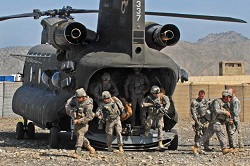 I know the name of this blog is Domestic Fuel, but I wanted to point out a story I found that makes the case how biodiesel might just help the U.S. win the war in Afghanistan.
I know the name of this blog is Domestic Fuel, but I wanted to point out a story I found that makes the case how biodiesel might just help the U.S. win the war in Afghanistan.
A new white paper from Wayne Arden, an expert in the financial technology field, and John Fox, a former CEO of a biodiesel company, makes the case that if biodiesel was produced in the landlocked country, U.S. and allied forces fighting the Taliban and Al Qaeda would gain certain advantages:
The first insight is that it is very expensive for the military to import fuel into Afghanistan. In October 2009 DOD officials reported to Congress that the average cost of importing fuel into Afghanistan, or the Fully Burdened Cost of Fuel (FBCF), approaches $400 per gallon when all direct and indirect costs are accounted for, and even sometimes exceeds $400. A 2008 Defense Science Board study, “More Fight Less Fuel,” described the FBCF as “several hundred dollars per gallon.”
The second insight is that modern biodiesel production technology is both proven technology and relatively inexpensive. The cost of building a medium-sized plant, even in Afghanistan, is on the order of tens of millions of dollars, not hundreds of millions or more.
The third insight is that a high percentage of U.S. casualties in Afghanistan stem from protecting convoys of fuel, water, and other military supplies. The Army calculated in a 2009 study that one casualty occurs for every 24 fuel resupply convoys in Afghanistan.
In addition, the paper points out that growing feedstocks for biodiesel would give Afghan farmers a cash crop other than opium, which fuels the bad guys’ efforts to kill our good guys. Safflower, which already grows in Afghanistan and is highly drought-resistant, seems like a good possibility. Throw in the fact that biodiesel’s higher ignition temperature makes it safer in a war zone and it’s a better lubricant, it appears the green fuel would be a good fit for our war fighters.
The paper also goes on to point out that a 12 million-gallon-a-year plant in Kandahar would cost as little as $90 million to build and get running. Considering the potential that the military could save $3.7 billion in its first year of operation, the plant would pay for itself in just a month. Now there’s an investment in all of our futures.
You can read more about the project on this website and on the white paper’s authors’ Facebook page, Biodiesel in Afghanistan.

